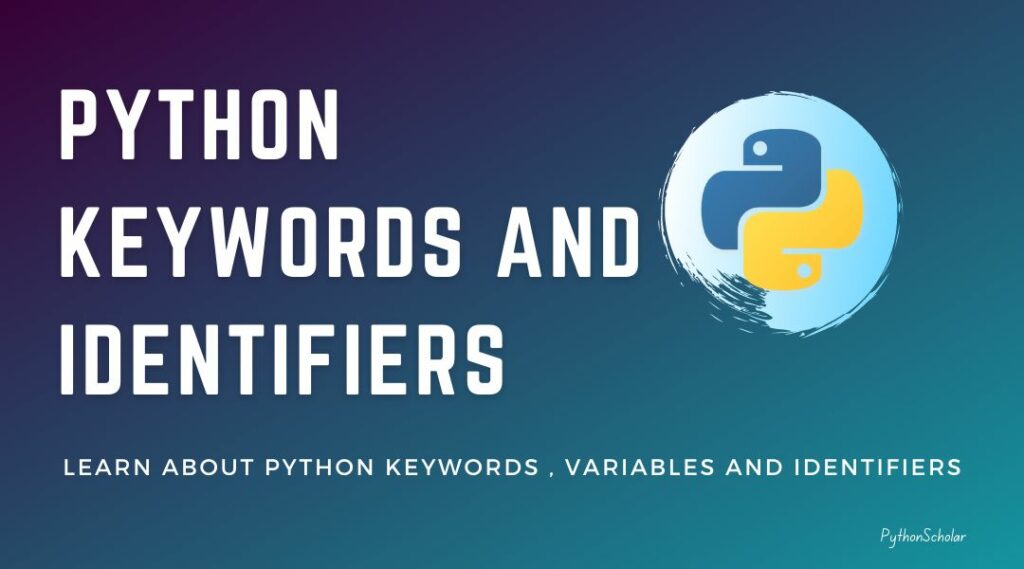This tutorial will teach about python keywords and identifiers, which will include reserved words in python.

What is PYTHON KEYWORDS
Python keywords are the python reserved words reserved by python language secured to define the python syntax and structure of the python language. We cannot use these reserved keywords as variable names, function names, class names, or other identifiers. In python, all the keywords are case-sensitive. All the python keywords should contain lowercase letters only except True, False, and None must be written as they are.
The following list shows the keywords in python.
| Keyword | Description |
| True | This keyword represents the Boolean Value ‘true.’ |
| False | This keyword represents the Boolean Value ‘false.’ |
| None | This keyword represents the Null Value |
| and | This is a logical operator |
| as | This keyword used for creating an alias |
| assert | The assert keyword is used to insert debugging assertions in the program. |
| async | This keyword is always used in the coroutine function body. |
| await | This keyword is used for asynchronous processing. |
| break | This keyword is used to break the loop. |
| class | This keyword is used to define a class. |
| continue | This keyword is used to take the control back to the loop. |
| def | This keyword is used to define a function. |
| del | This keyword is used to delete objects like variables, lists, or any other kind of object. |
| Elif | This keyword is used for a conditional statement along with an if statement. |
| else | This keyword is also used as a conditional statement, the same as above. |
| except | This keyword is used for exceptional handling in Python. |
| finally | This keyword is used for exceptional handling, but finally, the block will always get executed. |
| for | This keyword is used as a looping statement used to iterate over the elements of a sequence. |
| from | This keyword is used to import a function in python. |
| global | This keyword is used to declare global variables. |
| if | This keyword is used to declare a condition in Python. |
| import | This keyword is used for importing the module in python. |
| in | This keyword is used to check specific values are present in an iterable object. |
| is | This keyword is used to test object identity |
| lambda | This keyword is used to make anonymous functions. |
| nonlocal | This keyword is used to access the variables defined outside of the scope in the block. |
| not | This keyword is used to negates a Boolean value. |
| or | This keyword is used for a conditional statement where at least one condition must be fulfilled. |
| pass | This keyword is used to tell the program or a function to do nothing. |
| raise | This keyword is used to create a user define exception. |
| return | This keyword is used to return a value at the time function is exited |
| try | This keyword is used to specifies the exception handlers. |
| while | This keyword is used to run a block of statements till the expression is fulfilled |
| with | This keyword is used to open a file. |
| yield | This keyword is a replacement for a return keyword. |
At first, this keyword will look very difficult to understand but believe me, all the keywords will make sense once we continue with our python tutorial, and if your want to learn in-depth about keywords with examples, you can see this (Link to another page for keywords in details)
To see the latest list of python keywords, we can follow the following steps.
Step 1: Open Python IDLE or Python Interpreter
Step 2: Type the help() command to access the help shell.
Step 3: type keywords on the help shell, and you will get the following result of python keywords list inside the python interpreter.

Just like other compiled languages, python has an interpreter that helps to execute python code, you can learn more about python interpreter from here.
PYTHON IDENTIFIERS
Now let learn about what are python identifiers.
What Are Identifiers In Python?
Dentifiers in Python are used to assign a name to a variable or a function, making it easy for the programmer to refer to that object within the program. Identifiers are an essential part of Python programming and understanding how to use them correctly is crucial to writing effective Python code.
An identifier follows specific python rules that can combine an uppercase letter from A – Z or a lowercase a – z. It can also start with an underscore(_) followed by any number from 0 – 9 or letter.
Example a_data, a1, This_is_variable, and v_3 all are valid identifiers.
An identifier in python like 1name is invalid, and it cannot start with a digit. Also, keywords cannot be used as identifiers.
Rules for naming identifiers in Python:
- The first character of the identifier must be a letter (uppercase or lowercase) or an underscore (_).
- The identifier can consist of letters (uppercase or lowercase), numbers, or underscores (_).
- Identifiers are case sensitive. For example, “myVariable” and “myvariable” are two different identifiers in Python.
- Python keywords cannot be used as identifiers. For example, “if”, “else”, “while”, and “for” are all reserved keywords in Python and cannot be used as identifiers.
- Identifiers should be descriptive and meaningful. For example, “student_name” is a more meaningful identifier than “sn”.
- Avoid using single-letter identifiers except for very temporary variables.
- Identifiers should not start with a number. For example, “3students” is not a valid identifier in Python.
It is important to follow the rules for naming identifiers in Python to avoid syntax errors or other unexpected behavior in your code. In addition, using meaningful and descriptive identifiers can make your code easier to read and understand, especially for others who may be working with your code.
In conclusion, identifiers are an essential part of Python programming and are used to identify variables, functions, classes, modules, and other objects in Python code. It is important to follow the rules for naming identifiers in Python and to use meaningful and descriptive identifiers to make your code easier to read and understand.
We hope you will get clear idea about keywords and identifiers in python.
Python Identifiers Examples
Lets us see some examples of valid and invalid identifiers in python
Below are the list of valid python identifiers.
- abc123
- abc_de
- _abc
- ABC
- abc
Below is the examples of invalid identifiers in python.
- 123abc
- abc@
- 123
- for
conclusion on Python Keywords and Identifiers
In conclusion, Python keywords and identifiers play important roles in the language and are essential to writing effective Python code. Keywords are reserved words that have specific meanings within the language and cannot be used as identifiers, while identifiers are used to name variables, functions, classes, modules, and other objects in Python code.
It is important to follow the rules for naming identifiers in Python and to use descriptive and meaningful names for your identifiers. This can help make your code easier to read and understand, especially for others who may be working with your code.
Python keywords cannot be used as identifiers and cannot be redefined or overwritten. They are reserved for specific purposes within the language and have special meanings that cannot be changed.
By understanding and using Python keywords and identifiers correctly, you can write clean, readable, and maintainable code that is easy to understand and modify. So, always remember to choose your identifiers wisely and avoid using Python keywords as identifiers to prevent any unwanted syntax errors.
In summary, Python keywords and identifiers are fundamental concepts that every Python developer must understand and use properly to write efficient and effective Python code.
FAQs
Are python variable case sensitive?
Yes, the Python variable is case sensitive; both “Python” and “python” are different in a python programming language.
Is python case sensitive when dealing with identifiers?
Yes, Python is case-sensitive when we are dealing with identifiers.
How many keywords are there in Python?
As of Python 3.10, there are 35 keywords in Python.
What are some examples of Python keywords?
Examples of Python keywords include “if”, “else”, “while”, “for”, “class”, “def”, “try”, “except”, “finally”, “return”, and “yield”.
Why can’t Python keywords be used as identifiers?
Python keywords are reserved for specific purposes within the language and cannot be used as variable names, function names, or other identifiers. Using a keyword as an identifier can cause syntax errors or unexpected behavior in your code.
Can I use a keyword as part of an identifier?
No, you cannot use a keyword as part of an identifier. For example, “my_if_variable” is not a valid identifier in Python because it contains the keyword “if”.
Can Python keywords be redefined or overwritten?
No, Python keywords cannot be redefined or overwritten. They are reserved words in the language and have special meanings that cannot be changed.
How can I avoid using Python keywords in my code?
To avoid using Python keywords in your code, choose meaningful and descriptive names for your variables, functions, and other identifiers. If you’re not sure if a word is a keyword, you can check the Python documentation or use an IDE or text editor that highlights keywords in your code.
